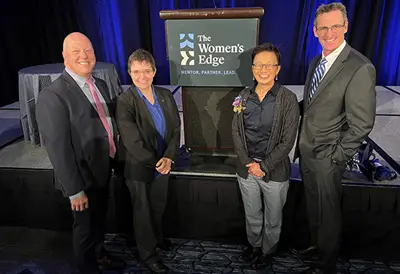Leaders Share Range of Lessons, From Leaving Comfort Zones to Combating Self-Doubt
 Image by Tory Wesnofske
Image by Tory Wesnofske
06/23/2023
By Brooke Coupal
Brig. Gen. Ginger Gaglio has lived in a fishbowl while climbing the ranks of the Massachusetts Air National Guard.
“I’ve spent 36 years in a male-dominated career,” she told a packed room at the sold-out sixth annual UMass Lowell Women’s Leadership Conference during the opening keynote. “(As a woman), you get noticed regardless of whether it’s good or bad. There’s no hiding.”
According to the U.S. Department of Defense’s latest annual demographics report, women make up 21.4% of the National Guard and 17.3% of the active-duty force.
Gaglio recalled desperately trying to fit in at the beginning of her military career, but said that as she’s grown as a leader, she has tried to help women feel like they belong.
“Leaders are supposed to inspire,” she said. “There’s room for more than one woman at the table.”
Gaglio encouraged everyone at the conference to not stay in their comfort zone – advice she received roughly 15 years ago that has stuck with her to this day.
“It will always make you grow as a leader if you get outside that comfort zone,” she said.
Pam Kuong, senior vice president and market director at Santander Bank, echoed this advice while delivering the closing keynote. At the age of 35, Kuong stepped out of her comfort zone by picking up golf to better relate to her all-male clients. Her golf game helped her build vital relationships with high-level executives, attorneys, accountants, wealth advisors and others.
 Image by Tory Wesnofske
Image by Tory Wesnofske
“For me, golf was the equalizer in a very male-dominated industry,” she said. “Men network with people who have common interests.”
Kuong also proved to be a natural at the sport and has gone on to compete in 30 United States Golf Association national championships.
“You don’t know what you’re capable of until you take on new opportunities,” she says.
In Kuong’s nearly four decades in banking, she has noticed that when presented with an opportunity, women will only apply if they have nearly all the skill sets required for the job, while men will apply if they only meet a few of the qualifications.
“Women think that you have to check off all the boxes, and you don’t,” she said. “Don’t wait to have all of the qualifications. Just take the chance.”
Between the two keynotes, conference-goers attended breakout sessions on various leadership topics. Chancellor Julie Chen shared encouraging words before the start of the sessions.
“Everyone can be a leader,” she said. “It’s not something you do by yourself. It’s something you do with the support of people around you.”
Representatives of the Greater Lowell Health Alliance (GLHA) stressed the power of coalitions in relationship-centered leadership. The GLHA brings together health care providers, business leaders, educators, and civic and community leaders who work toward the common goal of helping the community identify and address health and wellness priorities.
 Image by Tory Wesnofske
Image by Tory Wesnofske
“Think about the general population that is around you. What do they look like?” she asked. “Your coalition is to represent that community.”
Boston Police Superintendent Nora Baston ’95, ’00 and NASA principal investigator Evana Gizzi ’13, ’14 came together for a talk on navigating gender politics at work.
“We had to fight so much harder for our positions,” said Gizzi, who recalled instances of men downplaying her skills and taking credit for her work.
Baston said that while navigating gender politics is like playing chess, it’s important to hold onto your core values.
“If you meet anyone who knows me, they’re going to say, ‘She’s never changed,’” she said.
Gizzi and Baston agreed that it’s important to surround yourself with strong women who empower you, like Chancellor Chen.
“Julie Chen has been so good to me,” Gizzi says. “As a young female, I look up to her so much.”
First-time conference-goer Brianna Nil made sure to take lots of notes during each session.
 Image by Tory Wesnofske
Image by Tory Wesnofske
“Listening to everyone, I was like, ‘OK, that sounds really good. I think I want to implement that in my life. This will add to who I am,’” said the New England Network Solutions field engineer.
Selena Gaddis, a marketing manager at Juniper Networks, said she drew inspiration from the conference.
“Sometimes you’re so into your day-to-day, you forget to take a step back and reflect,” she said. “I’m taking away lessons and refreshers from this conference.”
Elizabeth Altman, an associate management professor in the Manning School of Business, and Heather Makrez Allen ’06, ’08, ’21, executive director of alumni and donor relations, co-chaired the Women’s Leadership Conference.
“Each year, we work with an accomplished committee of faculty and staff to bring in the best and brightest professionals to share their leadership perspectives with a community of women leaders, and this year was no exception,” Makrez Allen said. “It was an honor to be a part of, and we are grateful to everyone who supported the effort and attended the sessions. We look forward to building on this momentum for future women's leadership programming and conferences.”




